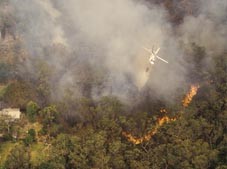In 2006, a record 9.8 million acres burned in wildfires. Will this year’s droughts make 2015 another record-breaker?
As of May 6, 2014, half of the United States was experiencing some level of drought. Nearly 15 percent of the nation was gripped by extreme to exceptional drought, according to NASA. This year, drought conditions could make wildfire a too-real possibility in many areas of the country. A few simple precautions can have a huge impact on the chances of your home surviving a wildfire.
Wildland blazes are only one cause of fire. There are about 2 million fires each year in the US, which cause estimated damage of $8.6 billion. Having adequate defensible space around structures can help keep wildfires at bay. The minimum recommended defensible space is a 100 foot perimeter free of combustible materials, but many experts advise 200 to 300 feet. Planting native vegetation in this zone is also recommended. If you live in a wildland area or at the urban/wildland interface, please contact us for further suggestions on protecting your home from wildfire.
Survival Basics
The first priority in any fire is to save lives and prevent injury. Make sure all family members know what to do in the event of a fire. Draw a floor plan with at least two ways of escaping every room and designate a safe meeting place outside the house. Test windows and doors to make sure they open and close easily. Check that you have smoke detectors installed in the proper areas and that they are in good working condition.
Talk with your family about basic fire safety. People should know how to sound the alarm, and be aware of the critical need to escape immediately without looking for valuables or pets. They shouldn’t even raise the alarm from the house phone. Get out and call from a neighbor’s. Tell your family how to stay low beneath the smoke, and how to feel a door before opening it. If it’s hot, go another way.
Prevention Better than Cure
Inside the home a few elementary precautions will drastically reduce the risk of fire. Keep space heaters away from anything that may burn and always switch them off when you leave home or go to sleep. Halogen lights also demand caution. Keep them away from drapes and low ceilings. Don’t overload extension cords or run them under rugs. Replace frayed electrical cords and unplug an appliance if it smokes or has an unusual smell.
Carelessly discarded cigarettes are a leading cause of fire deaths in the United States. Never smoke in bed or when you are sleepy. Also keep matches and lighters in a safe place away from children.
Be careful while cooking. Wear short or tight-fitting sleeves when you cook. Keep the handles of your pots turned inward so they do not hang over the edge of the stove. If grease catches fire, carefully slide a lid over the pan and smother the flames, then turn off the burner.
Protect Your Home with Adequate Insurance
With home values and construction costs rising significantly in recent years, it’s imperative to make sure your insurance policy will cover the cost of rebuilding. Any remodels should also be taken into account as should any custom features.
Your agent can help you review your policy to check what is covered and what is not. Make sure your policy includes coverage for building code upgrades. If you need to rebuild, you have to comply with current codes, which are usually a lot stricter than they were 10 or 20 years ago. If you have any detached structures that you use for business or rent out, check if they are covered. Do you have expensive jewelry, art or electronics? You might need a separate rider to cover these.
Make an inventory of your household contents. You don’t even have to make a list. Just make a video of everything that’s in your house. Point your camera or smartphone into every drawer and narrate as you go along. Then make a backup copy of the file and store it offsite—options include storing the file in the cloud for access anywhere and/or copying the file onto a thumbdrive and giving it to a family member or friend—preferably one who lives outside your home or neighborhood.
For more suggestions on protecting your home and family, please contact us.



